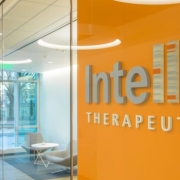In a review of recently published scientific studies, researchers with Queen Mary University of London discovered a gene that naturally suppresses the signs of Alzheimer’s disease in human brain cells.
Roche struck a $1.7 billion cancer drug pact with Blueprint Medicines, as advances in genetic testing for rare mutations drive lucrative deals for expensive treatments.
Sana Biotechnology, which launched during 2019, raised $700 million in initial financing that will be used to advance the company’s discovery and development programs that create and deliver engineered cells as a treatment for different disease types.
Three months after hearing loss-focused company Akouos secured $105 million in a Series B financing round, the Boston-based company is eying an initial public offering valued at about $100 million.
AstraZeneca and Daiichi Sankyo’s Enhertu helped patients with three different types of cancer live longer in trials, pointing to potential broader use of the breast cancer treatment.
BioSpace reviews some recently published scientific studies, including researchers with the University of Colorado Anschutz Medical Campus releasing a new study calling attention to the emergence of mosquito-borne viral outbreaks in West Africa.
British researchers will study the genes of thousands of ill COVID-19 patients to try to crack one of the most puzzling riddles of the novel coronavirus: why does it kill some people but give others not even a mild headache?
Research Roundup: Major Breakthrough in HIV Research and More
Australia, China, Coronavirus Disease 2019 (COVID-19), Drug Cocktails, Genes, Genetic Markers, Genomes, Germany, Herpes Simplex Virus, HIV, Immune Cells, Medical Journals, Mount Sinai, Neurodegenerative Diseases, New England Journal of Medicine, Nucleotides, R&D, RNA, San Francisco (UCSF), Science, Scientific studies, Severe Acute Respiratory Syndrome Coronavirus 2 (SARS-CoV-2), The Netherlands, Thrombosis Research, University of Alabama at Birmingham (UAB), University of Maryland Baltimore County, Walter and Eliza Hall InstituteA review of some recently published scientific studies, including researchers at the University of Maryland Baltimore County identifying a single nucleotide that controls two forms of the HIV virus’ RNA.
Researchers at the University of Pennsylvania School of Medicine found that certain changes in DNA sequences can trigger the resulting genome to misfold in such a way that the person is at increased risk for Type 1 diabetes.
Intellia Therapeutics is focused on implementing a full-spectrum genome editing approach, as the company has a pipeline spanning both in vivo and ex vivo therapies to address severe and life-threatening diseases.





 Biospace
Biospace


